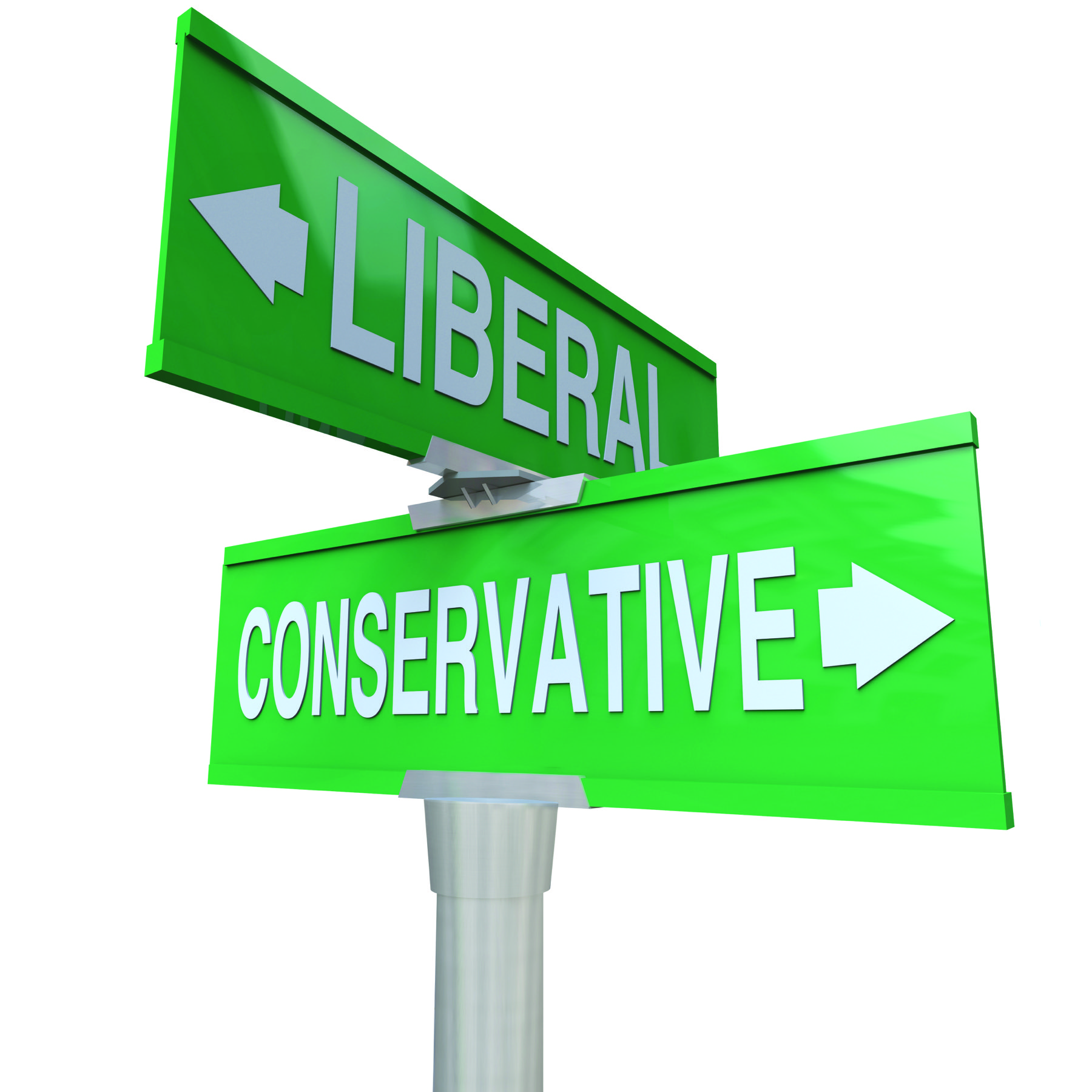 A green two-way street sign pointing to Liberal and Conservative, representing the two dominant political parties and ideologies in national and global politics
A green two-way street sign pointing to Liberal and Conservative, representing the two dominant political parties and ideologies in national and global politics My friendship with “Caroline” had been fading for years when, on a whim, I clicked on her Facebook page. When I landed there, I had a shock. She had replaced her previous personal photo — where she stands next to her husband, both of them smiling — with an illustration aiming daggers at political conservatives. It depicted a woman, seemingly Lady Justice, forcibly held down on a table. A man stands above her menacingly, his white hands projecting out of the sleeves of an expensive-looking suit. He gags the blindfolded woman with one hand as the other clamps down on her wrist, forcing her scales of justice to lay in disarray.
The pièce de résistance? The bold red-white-and-blue Republican elephant logos burnishing the man’s shirt cuffs.
I gaped at the image, feeling a true sense of loss. Caroline and I had been close for more than 20 years, beginning in junior high school. In high school and college, we were both left of center. Wasn’t everybody? I loved and admired Caroline. She was delightful, adventurous, smart, warm and on a path to success despite a difficult family background. During college, I introduced her to a friend of mine, thinking they would make a great couple. I was honored to be a witness at their wedding more than 30 years ago.
When I met my husband, I was introduced for the first time to conservative political and traditional Jewish teachings. I didn’t want them to make sense because, like so many Jews, I wore my liberal identity as a badge of honor. I resisted any paradigm shift in my self-perception or in how I perceived the world. But after long and careful consideration, I saw the value and wisdom in many conservative positions, both political and religious. My practices and beliefs drifted rightward, toward what I had previously considered “the dark side.” Caroline and I never talked politics after that shift but still found plenty of common ground in talking about our families, our jobs, books, music and more.
Living on opposite sides of the country, we connected less and less often. In our politically polarized culture, I felt increasingly cut off from Caroline, and she stopped taking the initiative to call or email. This also was true of other old left-leaning friends. Several years ago, one of them unfriended me on Facebook after I posted a link to an article with evidence that tighter gun control laws do not necessarily correlate with lower rates of gun violence.
“The Judy I knew used to be more nuanced,” she typed, severing all ties.
“It’s not healthy to live in a purist ideological bubble.”
Caroline’s choice to fuse her social media persona with her politics also felt like a final severing of our friendship. It demonized the left’s favorite target: white Republican men, and with its suggestion of sexual violence, it cheapened the experience of women who had endured such trauma.
Ironies abounded: Haven’t the majority of men accused of such crimes in recent years been famous Democrats? And, far from conservatives stifling dissent or even the right to speak, aren’t conservatives the ones who are frequently banned from speaking at universities, and threatened with violence if they do? Don’t leftists dominate college campuses, the vast majority of news outlets and social media? Google and YouTube censor and restrict access to more than 80 videos produced by the conservative Prager University. Spotify and Twitter also refuse advertising from certain conservative organizations.
Who exactly is gagging whom?
I have never regretted my decision to rethink my views, one that was scary at the time but one I know has provided a life of deeper meaning and joy. But I still miss the friendships with good, well-meaning people that had nourished me for so long, and which I knew would pay the price of my evolving viewpoints. I am blessed to have many longstanding, treasured friendships with like-minded individuals, but it’s not healthy to live in a purist ideological bubble. I would welcome respectful debate and discussion, but as many of my conservative friends have also found, liberal friends are usually unwilling to engage.
If meaningful engagement is too high a bar, maybe we can start by not demonizing those whose politics have strayed from our own.
Judy Gruen is the author of “The Skeptic and the Rabbi: Falling in Love with Faith.”























 More news and opinions than at a Shabbat dinner, right in your inbox.
More news and opinions than at a Shabbat dinner, right in your inbox.